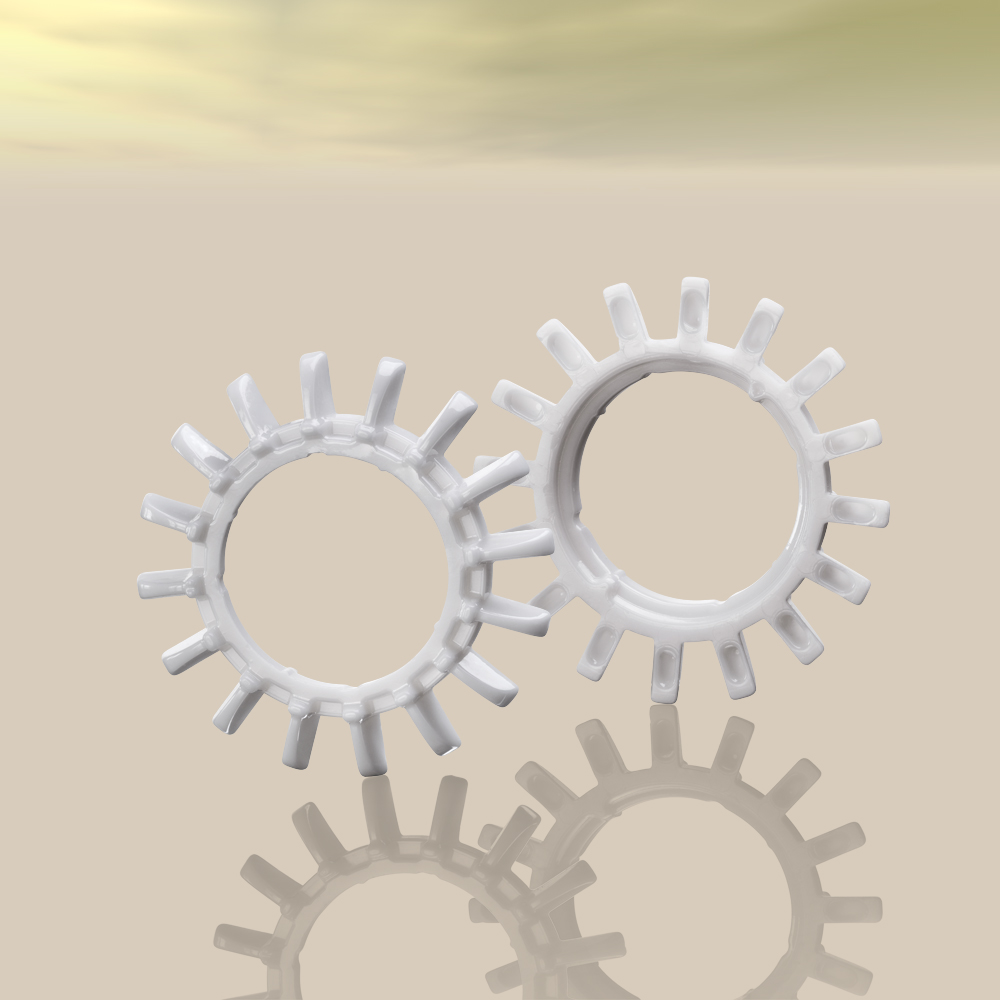22. November 2017
Safe and quick guiding and processing of threads and yarns

Major challenges are imposed on the processing of threads, fibers and yarns in textile machinery as the yarn passes through thread guides and other contact elements at high speed causing extreme wear on these parts. Contact surfaces require resistance to abrasion and high surface quality to prevent the thread from wearing down or breaking. Technical ceramics made of alumina materials have shown excellent results in these challenging applications. However, Sembach, the specialist supplier of technical ceramics, shows how the full potential of alumina can be used. The company has developed a process to refine the powdered source material and enhance the surface finishing of manufactured parts. A100 is a fine-grained C799 high-performance ceramic with high density. A special polishing process is used to give the manufactured parts extremely smooth and virtually non-porous surfaces.
Alumina is a chemical compound of aluminum and oxygen with the formula Al2O3. It is one of the most important oxide-ceramic materials. For most engineering applications, alumina is produced from bauxite and, after preparation, is processed as powder in different purity grades. Depending on the grade of purity, the specific density is 3.80 to 3.97 g/cm³ and the melting point is 2,050 °C. After diamond, alumina is one of the hardest materials. Moreover, it is characterized by high strength, wear resistance, resistance to corrosion and chemical effects as well as good dielectric properties. In addition, alumina is physiologically harmless and can withstand temperatures up to 1,750 °C.
High-performance ceramic for the textile industry
A100 is a variant of alumina and belongs to the materials class C799. Sembach has developed this material to meet the textile industry’s requirements for wear-resistant machine elements. The new material is based on an optimized method for the preparation of raw material and a special polishing technique is used to finish the surface of manufactured parts. Raw material preparation produces an extremely fine-grade powder with a D50 value significantly below 1 µm and high purity that is used as source material. The Al2O3 content of A100 is higher than 99.97 % and allows very high density close to the theoretical density of 3.99 g/cm³ resulting in better hardness and strength properties. Components made of A100 feature perfect, non-porous surfaces that are characterized by high hardness and wear resistance due to high material density and special polishing. Another advantage of A100 is that the processed yarn is not damaged by abrasion. A100 is therefore ideally suited for passive and active components in textile machines exposed to high stresses from wear such as thread guides and other thread processing elements, eyelets, oiling nozzles, nozzles, rollers and disks i.e. cutting disks and cutters, among others. The virtually non-porous surface allows abrasion-free processing without the risk of breaking of fibers and threads that are covered with an abrasive mesh. Another advantage of the extremely smooth surfaces is minimum thread tension allowing the processed yarn to be wound onto the spindle with high winding quality. Components made of Al2O3 and A100 in particular prove themselves, especially as they show no significant signs of wear in long-term use.
Raw material and process expertise
Sembach is a specialist ceramic supplier certified in accordance with the high standards of quality management ISO/TS 16949 for the automotive industry and over the course of many decades has gained extensive experience in the processing of alumina and the construction, shaping and manufacture of workpieces made of alumina. Modern and well-equipped production facilities allow Sembach to efficiently manufacture complex prototypes and large-batch components of A100 and other high-performance ceramics using injection molding, dry pressing, and extrusion and machining on a 5-axis milling machine.
Properties of alumina in accordance with DIN VDE 0035/DIN EN 60 672
- Very high hardness
- Very good sliding properties
- High to maximum mechanical strength
- Very high compressive strength
- High to very high thermal conductivity
- Very good electrical insulating properties
- Very good wear resistance
- Very good chemical and corrosion resistance
- Good thermal shock resistance
- High to maximum refractoriness
- Biocompatibility
- The Sembach injection molding process allows the manufacture of complex components made of alumina



